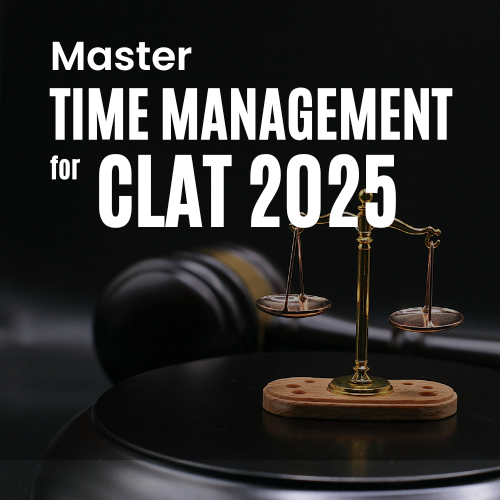Preparing for the CLAT 2025 can be a daunting task, especially when you’re juggling school, extra-curricular activities, and other commitments. Time management becomes crucial to ensure you cover the vast syllabus while also staying stress-free. But how do you balance it all and still make room for mock tests, revisions, and study breaks?
Let’s explore here! time management hacks that can help busy CLAT aspirants stay on top of their prep without burning out.
1. Set Clear Goals and Prioritize
Prioritizing helps you focus on tasks that will have the most impact on your score, ensuring you make steady progress without feeling overwhelmed.
Identify High-Priority Sections: Focus on subjects where you need the most improvement. For example, if your Legal Reasoning is weak, allocate extra time to this section.
Set Daily and Weekly Targets: Break down your long-term goals into daily and weekly targets. Instead of vague goals like “study English,” aim for something specific, like “complete 50 vocabulary flashcards” or “solve 5 comprehension passages.”
Use the SMART Framework: Make your goals Specific, Measurable, Achievable, Relevant, and Time-bound. For example, “Complete 2 Legal Reasoning mock tests by the end of the week.”
2. Create a Flexible Study Schedule
A balanced approach prevents burnout while ensuring consistent preparation.
Block Your Time: Divide your day into study blocks. A 2-hour block for CLAT prep in the morning and another in the evening can be more effective than studying for long hours at a stretch.
Allocate Time for Each Subject: Don’t spend all your time on one subject. Rotate between different sections like Logical Reasoning, English, Legal Reasoning, and General Knowledge to keep things fresh.
Make Room for Buffer Time: Life happens—unexpected assignments, family functions, or simply feeling unproductive. Schedule 1-2 buffer days every month to catch up on anything you missed.
3. Use the Pomodoro Technique for Focused Study
The Pomodoro Technique is a simple but effective time management hack that breaks your study time into focused intervals, usually 25 minutes of intense studying followed by a 5-minute break. After four Pomodoro cycles, you can take a longer break.
Short Bursts of Focus: Knowing you only need to concentrate for 25 minutes helps you stay focused without feeling mentally drained.
Regular Breaks: The built-in breaks prevent burnout and give your brain time to absorb the material.
Measure Progress: By counting how many Pomodoros you complete in a day, you can track your study time and feel accomplished.
Apps like Focus Booster or Pomodone can help you keep track of your study intervals.
4. Leverage Technology to Stay Organized
Being organized is half the battle won when preparing for CLAT. Several apps and tools can help you track your tasks, stay focused, and measure progress:
Todoist: A simple to-do list app where you can plan daily, weekly, or monthly tasks. Set reminders for mock tests, revision days, or sectional tests.
Google Calendar: Schedule your study blocks, mock tests, and breaks. You can even color-code different subjects for a clearer overview.
Evernote: Take notes, clip important legal articles or current affairs news, and keep everything in one place for easy revision later.
Forest App: If you struggle to stay off your phone, use this app to build a virtual forest. The longer you stay off your phone, the more trees you grow!
5. Integrate Mock Tests into Your Routine
Schedule Mock Tests Weekly: Instead of cramming several mocks at the last minute, take one full-length mock test every week. Schedule it for a time when you’re most alert, like the weekend or early mornings.
Set Aside Time for Review: Half the benefit of a mock test comes from analyzing it. Dedicate an hour after each mock to review your mistakes, work on weak areas, and note down strategies for improvement.
Track Your Progress: Keep a record of your scores and focus on improving them each week. Mock tests will help you measure your time management skills during the exam as well.
6. Time Your Sectional Practice
When practicing individual sections, always keep a timer. This will help you develop a natural sense of how long to spend on each question.
English and Logical Reasoning: For these, focus on both speed and accuracy. Set a time limit when practicing comprehension or reasoning questions.
Legal Reasoning: This section requires deep analysis, so practice reading quickly without missing crucial information. Over time, you’ll get faster at spotting the key elements in legal passages.
General Knowledge: Use your downtime to revise current affairs. Whether you’re traveling or taking a break, read the news or flip through GK flashcards.
7. Take Meaningful Breaks
Remember, breaks are not a waste of time—they’re essential to sustaining productivity and focus.
Active Breaks: Go for a walk, stretch, or engage in light physical activity. This helps refresh your mind and body, improving focus when you return to studying.
Rest Your Eyes: Take a few minutes every hour to rest your eyes, especially if you’re studying from a screen.
Mini Hobbies: Engage in small activities like listening to music, doodling, or playing a game that helps you relax without completely derailing your schedule.
8. Get Enough Sleep
Rested minds perform better, so make sleep a priority during your CLAT preparation.
Avoid All-Nighters: Studying late into the night might seem productive, but it decreases retention. Instead, follow a consistent sleep schedule.
Power Naps: If you’re feeling too drained, a short 20-minute nap can help you recharge and stay focused for longer.
Stay Hydrated: Drink enough water during the day to prevent fatigue and maintain your energy levels.
When it comes to CLAT preparation, it’s not about how many hours you put in, but how effectively you manage your time. By setting clear goals, using technology to stay organized, and focusing on both study time and meaningful breaks, you’ll ensure you get the most out of your preparation while avoiding burnout.
Time management is a skill, and just like any other skill, it can be improved with consistent effort. Start by incorporating these hacks into your daily routine and watch your productivity soar!



